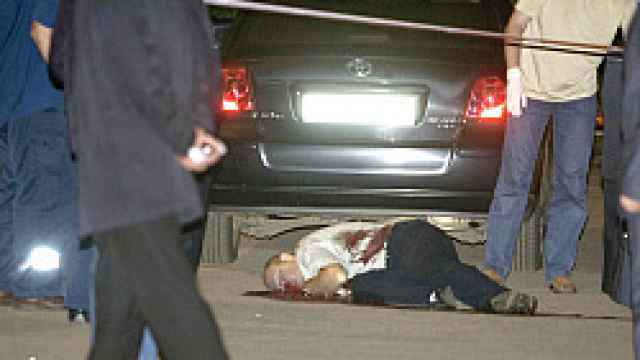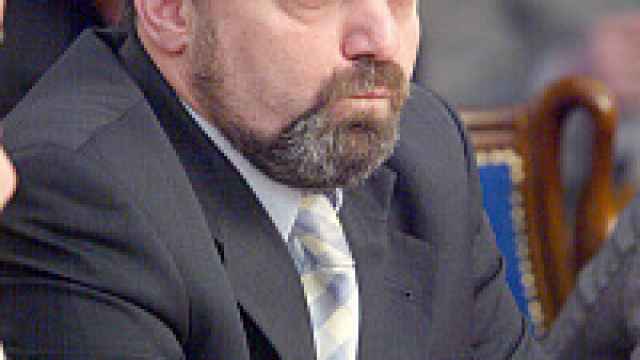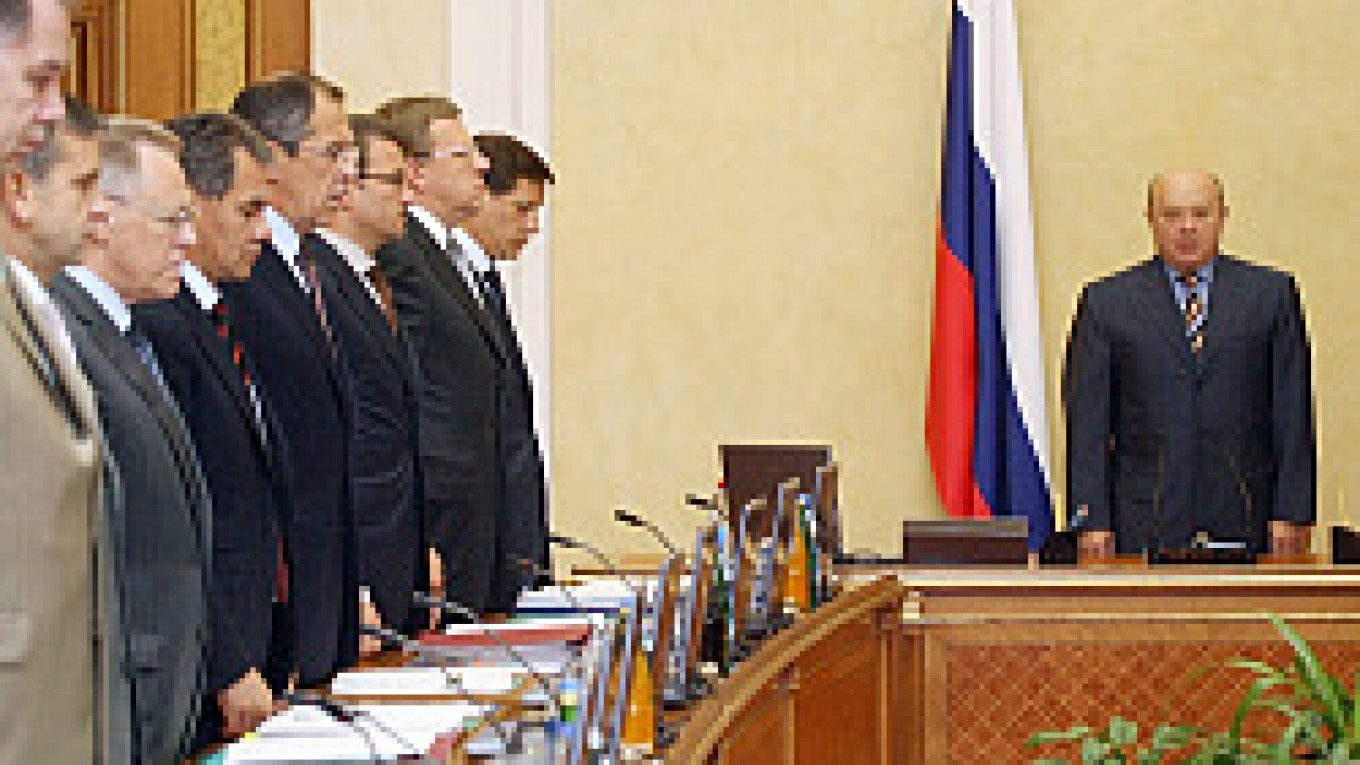Kozlov, 41, the bank's first deputy head, and his driver, Alexander Semyonov, 54, were shot by two gunmen with automatic pistols Wednesday evening as Kozlov was exiting the Spartak sports complex.
Kozlov had been at the complex, in northeast Moscow, to take part in a friendly football match with other banking community members. After the shooting, Kozlov was rushed to a hospital, where he died hours later.
It was the highest-profile slaying since President Vladimir Putin took power in 2000, and reminiscent of the more violent 1990s, under Boris Yeltsin.
A longtime Central Bank official, Kozlov oversaw the closure of 44 banks accused of improper activities this year alone. He had also pushed for mandatory deposit insurance for banks, which was particularly important to millions of Russians who lost their savings in financial crises in the 1990s.
Most recently, he had lobbied for a permanent ban on those convicted of tax evasion from working in the banking sector.
Kozlov's killing has raised concerns among many in the banking sector that these reforms and others could be stalled.
While the investigation has just begun, several senior government officials and banking sector experts said Kozlov died because of his work.
"He was a very brave and honest man, and through his activity he repeatedly encroached on the interests of unprincipled financiers," Finance Minister Alexei Kudrin said in a statement Thursday.
Prime Minister Mikhail Fradkov, in televised comments, on Thursday called for a minute of silence in honor of Kozlov at a government meeting. Cabinet members appeared shocked and sad.
Fradkov also praised the Central Bank for its efforts to make the banking system more transparent.
"This is truly a very complicated task," the prime minister said. "Creation of fair conditions is not always accepted by those who wish to have certain advantages and privileges."
Fradkov ordered Interior Minister Rashid Nurgaliyev to do whatever necessary to apprehend those involved in the deadly attack. Prosecutor General Yury Chaika has personally taken charge of the case.
Anatoly Chubais, head of Unified Energy Systems, the national electricity monopoly, was visibly shocked Thursday as he spoke of the banker, also in televised comments.
"His murder is an impudent challenge to all of Russia's authorities," said Chubais, who knew Kozlov. "It is a case when the response of the authorities must be tough, prompt and pitiless."
 Reuters Investigators working at the site of the shooting late Wednesday. Kozlov's driver was shot twice and died on the spot. | |
On Thursday, details of the killing were still being pieced together by investigators.
A police spokesman said Thursday that Kozlov and his driver were attacked at 8:47 p.m., at the parking lot near a fenced-in soccer field.
Kozlov was shot in the head, chest and stomach. He was taken to the city's Hospital No. 33, where doctors operated on him for five hours. He died at 5:30 a.m. without ever having regained consciousness.
Semyonov, the driver, died on the spot.
Investigators have retrieved from the site a silencer and several 9-millimeter bullets and spent shells, the police spokesman said. The Prosecutor General's Office said in a statement later Thursday that two pistols -- a makeshift contraption and a Baikal air pistol that had been reconfigured to fire real ammunition -- were found 250 to 300 meters from the crime scene, at 3 Oleny Val Street.
The crime scene remained off-limits to reporters Thursday, but those who showed up at the complex to take part in a sporting activity were admitted. Investigators were spotted working Thursday afternoon in the cordoned-off area where the attack took place; they refused to answer questions, forcing one reporter off the premises with guard dogs.
A security guard who asked not to be named said the complex was popular among Moscow's rich and powerful. "Sometimes we get cars with blue lights," he said, referring to the government-issue lights on car roofs that give drivers the right to go as fast as they want.
The complex, near Sokolniki park, is festooned with ponds and shaded woodlands. "A very suitable place to murder somebody," said Natalya Sveridova, pushing a baby carriage with her 6-month-old daughter inside. "You can escape through the trees, get in a car and go north, out of the city, or back into the city."
 Denis Grishkin / Vedomosti Andrei Kozlov | |
"Usually, central banking is a quiet job, but unfortunately in Russia, it's not," Moritz Schularick, an economist with the London-based asset manager Amiya Capital, said in between meetings at a UBS conference in Moscow.
Chubais' comments were echoed by those of Richard Hainsworth, CEO of RusRating banks rating agency.
"This is not an ordinary death," Hainsworth said in an open letter. "This is not just another assassination. It is an act of terror. It is the elimination of a true son of Russia who has stood up to the forces of evil in his country and who began to build the foundations of true prosperity for Russia's people."
Andrei Vernikov, a friend of Kozlov and an economist, called him a professional seeking to make Russia more fair and transparent.
And Vladimir Kievsky, vice president of the Association of Russian Banks, said Kozlov had helped the country move closer to a "civilized global banking system."
"His contribution is immense," Kievsky said. "Andrei Andreyevich charted a course [for banking reform]. It will be very difficult without him, but we must continue this work," he said.
Born in Moscow on Jan. 6, 1965, Kozlov, started his career at the State Bank of the Soviet Union in 1989. He joined the Central Bank after the 1991 Soviet collapse, reaching the bank's highest echelons by the mid-1990s and becoming first deputy head in 1997.
From 1999 to 2001, Kozlov took a break from government. During that time, he served as board chairman of the Russky Standard bank and also worked for a subsidiary of Aeroflot.
Kozlov is survived by his wife, Yekaterina, and three children.
Staff Writers Nabi Abdullaev, David Nowak and Miriam Elder contributed to this report.
A Message from The Moscow Times:
Dear readers,
We are facing unprecedented challenges. Russia's Prosecutor General's Office has designated The Moscow Times as an "undesirable" organization, criminalizing our work and putting our staff at risk of prosecution. This follows our earlier unjust labeling as a "foreign agent."
These actions are direct attempts to silence independent journalism in Russia. The authorities claim our work "discredits the decisions of the Russian leadership." We see things differently: we strive to provide accurate, unbiased reporting on Russia.
We, the journalists of The Moscow Times, refuse to be silenced. But to continue our work, we need your help.
Your support, no matter how small, makes a world of difference. If you can, please support us monthly starting from just $2. It's quick to set up, and every contribution makes a significant impact.
By supporting The Moscow Times, you're defending open, independent journalism in the face of repression. Thank you for standing with us.
Remind me later.


